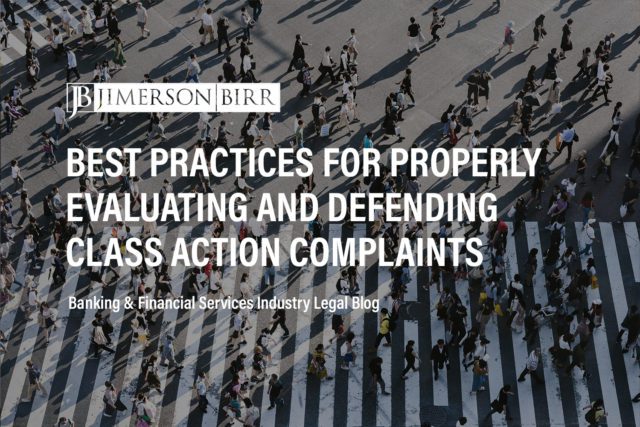What do opposing or limiting class claims and certification size entail?
In Florida, class action litigation defense often involves opposing or limiting class claims, size, or certification through evidentiary hearings. This process entails presenting facts, expert witness testimony, and evidence to challenge the legitimacy of class certification or the scope of the class claims. In Florida, this is accomplished by thoroughly researching and analyzing relevant state and federal cases, statutes, codes, rules of procedure, regulations, and secondary sources to build a strong defense against class certification.
Need help opposing a class certification? Schedule your consultation today with a top class action defense attorney.
Which Florida and federal laws and regulations apply to opposing or limiting class claims and certification size?
In Florida, class action litigation defense follows state and federal laws and regulations. For example, Florida Rule of Civil Procedure 1.220 outlines the state’s class certification requirements, including numerosity, commonality, typicality, and adequacy of representation. In addition, these rules guide how to effectively oppose or limit class claims, size, or certification in evidentiary hearings.
At the federal level, Rule 23 of the Federal Rules of Civil Procedure also governs class actions, including the certification process and the standards for opposition. Defense attorneys must be well-versed in state and federal laws and regulations to effectively challenge class certification or limit the scope of class claims in evidentiary hearings.
Understanding and applying these laws and regulations, as well as relevant case law and secondary sources, is crucial for a successful defense strategy in opposing or limiting class claims, size, or certification in Florida class action litigation.
What are the strategic benefits of opposing or limiting class claims and certification size in class action defense?
Opposing or limiting class claims, size, or certification in evidentiary hearings through the presentation of fact and expert witness testimony and evidence in class action litigation defense matters offers the following strategic benefits:
- Cost reduction: By challenging class certification and limiting the class size, defense attorneys can effectively reduce the potential damages and litigation costs associated with class action lawsuits. This process allows for a more efficient allocation of resources and may result in more favorable settlement negotiations.
- Increased control over cases: Successfully opposing or limiting class claims can give defense attorneys greater control over the litigation. Instead of facing a large class with potentially diverse claims, they can focus on individual plaintiffs and tailor their defense strategy accordingly, increasing the likelihood of success.
- Avoiding negative precedent: Opposing class certification and preventing a class from being certified can help prevent the establishment of negative legal precedents that could affect future cases. This avoidance is significant in the rapidly evolving area of class action law, where unfavorable decisions can have important implications for businesses and other defendants.
- Reducing plaintiff leverage: In class action litigation, plaintiffs often rely on the threat of a large class and the potential for significant damages to force defendants into settlements. By successfully opposing class certification or limiting the class size, defense attorneys can reduce the plaintiff’s leverage in settlement negotiations, leading to more favorable outcomes for their clients.
- Encouraging individual claims: When class certification is denied or limited, plaintiffs may be more inclined to pursue individual claims, resulting in cases being resolved more quickly and efficiently, with fewer resources expended on complex class action litigation.
- Highlighting weaknesses in the plaintiff’s case: Presenting fact and expert witness testimony during evidentiary hearings can help defense attorneys expose weaknesses in the plaintiff’s case, such as flaws in their methodology or insufficient evidence to support their claims.
In conclusion, opposing or limiting class claims, size, or certification in evidentiary hearings through presenting fact and expert witness testimony and evidence offers numerous strategic benefits for defense attorneys in class action litigation. By employing these tactics, attorneys can protect their clients’ interests and work towards more favorable outcomes in these complex legal proceedings.
What steps should a class action defendant take to oppose or limit class claims and certification size, and how will class action plaintiffs generally respond?
Class action defendants seeking to oppose a class certification should follow these steps:
- Conduct thorough research on Florida and federal cases, statutes, codes, rules of procedure, regulations, and secondary sources relevant to opposing or limiting class claims, size, or certification in evidentiary hearings.
- Identify and analyze the critical elements of the class action complaint and evaluate the appropriateness of class certification.
- Develop strong legal arguments that challenge the class certification based on commonality, typicality, and adequacy of representation, as well as the predominance of individual issues over common issues.
- Prepare and present persuasive expert witness testimony and evidence that counters the plaintiff’s arguments for class certification.
- Consider utilizing strategic motions such as summary judgment or motions to dismiss to narrow the scope of the case or eliminate specific claims.
In response, class action plaintiffs typically take the following steps:
- Conduct their research on relevant Florida and federal cases, statutes, codes, rules of procedure, regulations, and secondary sources to support their arguments for class certification.
- Develop and present expert witness testimony and evidence supporting class certification’s appropriateness.
- Address the defendant’s challenges to class certification by emphasizing the common issues among the class members and demonstrating the typicality and adequacy of the named plaintiffs’ claims.
- Refute any defenses the defendant raises, such as lack of standing, the statute of limitations, or failure to state a claim.
Legal defenses against opposing or limiting class claims, size, or certification in evidentiary hearings include:
- Lack of standing: Arguing that the plaintiffs do not have a legal right to sue.
- Statute of limitations: Asserting that the plaintiffs’ claims are time-barred.
- Failure to state a claim: Challenging the legal sufficiency of the plaintiffs’ allegations.
- No commonality: Arguing that the proposed class members do not share common questions of law or fact.
When a set of facts is appropriate to oppose or limit class claims and certification size, there are many paths a claimant may take. We are value-based attorneys at Jimerson Birr, which means we look at each action with our clients from the point of view of costs and benefits while reducing liability. Then, based on our client’s objectives, we chart a path to seek appropriate remedies.
To determine whether a unique situation may necessitate litigation, please contact our office to set up your initial consultation.
Frequently Asked Questions
- What key factors does a court consider when deciding whether to certify a class action?
The court considers factors such as commonality, typicality, adequacy of representation, and predominance of common issues over individual issues.
2. Can a class action defendant appeal a class certification decision?
Yes, a class action defendant may seek an appeal of a class certification decision. However, the appeal process may be limited and subject to specific requirements and deadlines.
3. How can a class action defendant challenge the appropriateness of a class representative?
A defendant can challenge the appropriateness of a class representative by arguing that the representative’s claims are not typical of the class, that the representative has a conflict of interest, or that the representative cannot adequately represent the class members.
Have more questions about a class certification-related situation?
Crucially, this overview of opposing or limiting class claims and certification size does not begin to cover all the laws implicated by this issue or the factors that may compel the application of such laws. Every case is unique, and the laws can produce different outcomes depending on the individual circumstances.
Jimerson Birr attorneys guide our clients to help make informed decisions while ensuring their rights are respected and protected. Our lawyers are highly trained and experienced in the nuances of the law, so they can accurately interpret statutes and case law and holistically prepare individuals or companies for their legal endeavors. Through this intense personal investment and advocacy, our lawyers will help resolve the issue’s complicated legal problems efficiently and effectively.
Having a Jimerson Birr attorney on your side means securing a team of seasoned, multi-dimensional, cross-functional legal professionals. Whether it is a transaction, an operational issue, a regulatory challenge, or a contested legal predicament that may require court intervention, we remain tireless advocates at every step. Being a value-added law firm means putting the client at the forefront of everything we do. We use our experience to help our clients navigate even the most complex problems and come out the other side triumphant.
If you want to understand your case, the merits of your claim or defense, potential monetary awards, or the amount of exposure you face, you should speak with a qualified Jimerson Birr lawyer. Our experienced team of attorneys is here to help. Call Jimerson Birr at (904) 389-0050 or use the contact form to schedule a consultation.

We live by our 7 Superior Service Commitments
- Conferring Client-Defined Value
- Efficient and Cost-Effective
- Accessibility
- Delivering an Experience While Delivering Results
- Meaningful and Enduring Partnership
- Exceptional Communication Based Upon Listening
- Accountability to Goals










